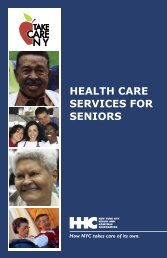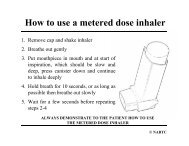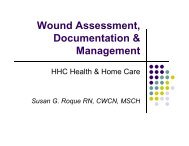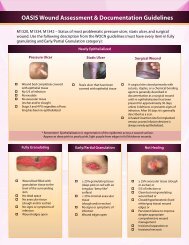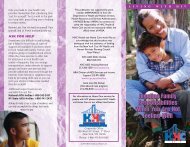- Page 1 and 2:
HHC Health & Home Care Clinical Pol
- Page 3 and 4:
Title Procedure Page 4.06 Gastroint
- Page 5 and 6:
Title Procedure Page 9.16 Infusion
- Page 7 and 8:
Title Procedure Page 14.14 Emergenc
- Page 9 and 10:
HHC HEALTH & HOME CARE SECTION: 1-2
- Page 11 and 12:
HHC HEALTH & HOME CARE SECTION: 1-3
- Page 13 and 14:
HHC HEALTH & HOMECARE SECTION: 1-4
- Page 15 and 16:
HHC HEALTH & HOMECARE SECTION: 1-5
- Page 17 and 18:
HHC HEALTH & HOME CARE SECTION: 2-1
- Page 19 and 20:
HHC HEALTH & HOME CARE SECTION: 2-2
- Page 21 and 22:
HHC HEALTH & HOME CARE SECTION: 2-3
- Page 23 and 24:
HHC HEALTH & HOMECARE SECTION: 2-4
- Page 25 and 26:
HHC HEALTH & HOMECARE SECTION: 2-4
- Page 27 and 28:
HHC HEALTH & HOME CARE SECTION: 2-6
- Page 29 and 30:
HHC HEALTH & HOMECARE SECTION: 2-7
- Page 31 and 32:
HHC HEALTH & HOME CARE SECTION: 2-9
- Page 33 and 34:
HHC HEALTH & HOME CARE SECTION: 2-1
- Page 35 and 36:
HHC HEALTH & HOME CARE SECTION: 2-1
- Page 37 and 38:
HHC HEALTH & HOME CARE SECTION: 2-1
- Page 39 and 40:
HHC HEALTH & HOME CARE SECTION: 2-1
- Page 41 and 42:
HHC HEALTH & HOME CARE Respiratory:
- Page 43 and 44:
HHC HEALTH & HOME CARE Section: 3-1
- Page 45 and 46:
HHC HEALTH & HOME CARE Section: 3-3
- Page 47 and 48:
HHC HEALTH & HOME CARE Section: 3-4
- Page 49 and 50:
HHC HEALTH & HOME CARE Section: 3-6
- Page 51 and 52:
HHC HEALTH & HOME CARE Section: 3-8
- Page 53 and 54:
HHC HEALTH & HOME CARE Cardiac Refe
- Page 55 and 56:
HHC HEALTH & HOME CARE Section: 4-2
- Page 57 and 58:
HHC HEALTH & HOME CARE Section: 4-4
- Page 59 and 60:
HHC HEALTH HOME CARE Section: 4-5 G
- Page 61 and 62:
HHC HEALTH HOME CARE Section: 4-6 G
- Page 63 and 64:
HHC HEALTH HOME CARE Section: 4-7 G
- Page 65 and 66:
HHC HEALTH & HOME CARE Section: 4-1
- Page 67 and 68:
HHC HEALTH & HOME CARE Section: 4-1
- Page 69 and 70:
HHC HEALTH & HOME CARE Gastrointest
- Page 71 and 72:
HHC HEALTH & HOME CARE Section 5-2
- Page 73 and 74:
HHC HEALTH & HOME CARE Section 5-4
- Page 75 and 76:
HHC HEALTH & HOME CARE Section: 5-6
- Page 77 and 78:
HHC HEALTH & HOME CARE Section: 5-8
- Page 79 and 80:
HHC HEALTH & HOME CARE Section: 5-1
- Page 81 and 82:
HHC HEALTH & HOME CARE Section: 5-1
- Page 83 and 84:
HHC HEALTH & HOME CARE Section: 5-1
- Page 85 and 86:
HHC HEALTH & HOME CARE Section: 5-1
- Page 87 and 88:
HHC HEALTH & HOME CARE Section: 5-1
- Page 89 and 90:
HHC HEALTH & HOME CARE Section: 5-2
- Page 91 and 92:
HHC HEALTH & HOME CARE Section: 5-2
- Page 93 and 94:
HHC HEALTH & HOME CARE Section: 5-2
- Page 95 and 96:
HHC HEALTH & HOME CARE GenitoUrinar
- Page 97 and 98:
HHC HEALTH & HOME CARE Section: 6-2
- Page 99 and 100:
HHC HEALTH & HOME CARE Section: 6-4
- Page 101 and 102:
HHC HEALTH & HOME CARE Section: 6-6
- Page 103 and 104:
HHC HEALTH & HOME CARE Section: 6-8
- Page 105 and 106:
HHC HEALTH & HOME CARE Section: 6-1
- Page 107 and 108:
HHC HEALTH & HOME CARE Section: 7-1
- Page 109 and 110:
HHC HEALTH & HOME CARE Section: 7-2
- Page 111 and 112:
HHC HEALTH & HOME CARE Section: 7-3
- Page 113 and 114:
HHC HEALTH & HOME CARE Section: 7-5
- Page 115 and 116:
HHC HEALTH & HOME CARE Section: 7-6
- Page 117 and 118:
HHC HEALTH & HOME CARE Section: 7-7
- Page 119 and 120:
HHC HEALTH & HOME CARE Section: 7-8
- Page 121 and 122:
HHC HEALTH & HOME CARE Section: 7-9
- Page 123 and 124:
HHC HEALTH & HOME CARE Section: 7-1
- Page 125 and 126:
HHC HEALTH & HOME CARE Section: 7-1
- Page 127 and 128:
HHC HEALTH & HOME CARE Section: 7-1
- Page 129 and 130:
HHC HEALTH & HOME CARE Section: 7-1
- Page 131 and 132:
HHC HEALTH & HOME CARE Section: 7-1
- Page 133 and 134:
HHC HEALTH & HOME CARE Section: 7-1
- Page 135 and 136:
HHC HEALTH & HOME CARE Section: 7-2
- Page 137 and 138:
HHC HEALTH & HOME CARE Section: 7-2
- Page 139 and 140:
HHC HEALTH & HOME CARE Skin Care: R
- Page 141 and 142:
HHC HEALTH & HOME CARE Section: 8-2
- Page 143 and 144:
HHC HEALTH & HOME CARE Section: 8-3
- Page 145 and 146:
HHC HEALTH & HOME CARE Section: 8-5
- Page 147 and 148:
HHC HEALTH & HOME CARE Section: 8-7
- Page 149 and 150:
HHC HEALTH & HOME CARE Section: 8-9
- Page 151 and 152:
HHC HEALTH & HOME CARE Section: 8-1
- Page 153 and 154:
HHC HEALTH & HOME CARE Section: 8-1
- Page 155 and 156:
HHC HEALTH & HOME CARE Section: 8-1
- Page 157 and 158:
HHC HEALTH & HOME CARE Section: 8-1
- Page 159 and 160:
HHC HEALTH & HOME CARE Medications:
- Page 161 and 162:
HHC HEALTH & HOME CARE Section: 9-1
- Page 163 and 164:
HHC HEALTH & HOME CARE Section: 9-2
- Page 165 and 166:
HHC HEALTH & HOME CARE Section: 9-4
- Page 167 and 168:
HHC HEALTH & HOME CARE Section: 9-5
- Page 169 and 170:
HHC HEALTH & HOME CARE Section: 9-7
- Page 171 and 172:
HHC HEALTH & HOME CARE Section: 9-8
- Page 173 and 174:
HHC HEALTH & HOME CARE Section: 9-8
- Page 175 and 176:
HHC HEALTH & HOME CARE Section: 9-9
- Page 177 and 178:
HHC HEALTH & HOME CARE Section: 9-1
- Page 179 and 180:
HHC HEALTH & HOME CARE Section: 9-1
- Page 181 and 182:
HHC HEALTH & HOME CARE Section: 9-1
- Page 183 and 184:
HHC HEALTH & HOME CARE Section: 9-1
- Page 185 and 186:
HHC HEALTH & HOME CARE Section: 9-1
- Page 187 and 188:
HHC HEALTH & HOME CARE Section: 9-1
- Page 189 and 190:
Infusion Therapy Section: 9-17 Infu
- Page 191 and 192:
HHC HEALTH & HOME CARE Section: 9-1
- Page 193 and 194:
HHC HEALTH & HOME CARE Section: 9-2
- Page 195 and 196:
HHC HEALTH & HOME CARE Section: 9-2
- Page 197 and 198:
HHC HEALTH & HOME CARE Section: 9-2
- Page 199 and 200:
HHC HEALTH & HOME CARE Section: 9-2
- Page 201 and 202:
HHC HEALTH & HOME CARE Section: 9-2
- Page 203 and 204:
HHC HEALTH & HOME CARE Section: 9-2
- Page 205 and 206:
HHC HEALTH & HOME CARE Section: 9-2
- Page 207 and 208:
HHC HEALTH & HOME CARE Section: 9-2
- Page 209 and 210:
HHC HEALTH & HOME CARE Section: 9-2
- Page 211 and 212:
HHC HEALTH & HOME CARE Section: 9-2
- Page 213 and 214:
HHC HEALTH & HOME CARE Section: 9-2
- Page 215 and 216:
HHC HEALTH & HOME CARE Section: 9-2
- Page 217 and 218:
HHC HEALTH & HOME CARE Section: 9-2
- Page 219 and 220:
HHC HEALTH & HOME CARE Section: 9-2
- Page 221 and 222:
HHC HEALTH & HOME CARE Section: 9-2
- Page 223 and 224:
HHC HEALTH & HOME CARE Section: 9-2
- Page 225 and 226:
HHC HEALTH & HOME CARE Section: 9-3
- Page 227 and 228:
HHC HEALTH & HOME CARE Section: 9-3
- Page 229 and 230:
HHC HEALTH & HOME CARE Infusion The
- Page 231 and 232:
HHC HEALTH & HOME CARE Section: 10-
- Page 233 and 234:
HHC HEALTH & HOME CARE Section: 10-
- Page 235 and 236:
HHC HEALTH & HOME CARE Section: 10-
- Page 237 and 238:
HHC HEALTH & HOME CARE Section: 10-
- Page 239 and 240:
HHC HEALTH & HOME CARE Section: 10-
- Page 241 and 242:
HHC HEALTH & HOME CARE Section: 10-
- Page 243 and 244:
HHC HEALTH & HOME CARE Section: 10-
- Page 245 and 246:
HHC HEALTH & HOME CARE Section: 10-
- Page 247 and 248:
HHC HEALTH & HOME CARE Section: 10-
- Page 249 and 250:
HHC HEALTH & HOME CARE Section: 10-
- Page 251 and 252:
HHC HEALTH & HOME CARE Section: 10-
- Page 253 and 254:
HHC HEALTH & HOME CARE Section 11-1
- Page 255 and 256:
HHC HEALTH & HOME CARE Section 11-2
- Page 257 and 258:
HHC HEALTH & HOME CARE Section: 11-
- Page 259 and 260:
HHC HEALTH & HOME CARE Section: 11-
- Page 261 and 262:
HHC HEALTH & HOME CARE Section: 11-
- Page 263 and 264:
HHC HEALTH & HOME CARE Section: 11-
- Page 265 and 266:
HHC HEALTH & HOME CARE Section: 11-
- Page 267 and 268:
HHC HEALTH & HOME CARE Section: 11-
- Page 269 and 270:
HHC HEALTH & HOME CARE Section: 11-
- Page 271 and 272:
HHC HEALTH & HOME CARE Section: 11-
- Page 273 and 274:
HHC HEALTH & HOME CARE Section: 11-
- Page 275 and 276:
HHC HEALTH & HOME CARE Section: 11-
- Page 277 and 278:
HHC HEALTH & HOME CARE Section: 11-
- Page 279 and 280:
HHC HEALTH & HOME CARE Section: 12-
- Page 281 and 282:
Name: Vitamin? Yes No Brand: Date P
- Page 283 and 284:
HHC HEALTH & HOME CARE Section: 13-
- Page 285 and 286:
HHC HEALTH & HOME CARE Section: 13-
- Page 287 and 288:
HHC HEALTH & HOME CARE Section: 13-
- Page 289 and 290:
HHC HEALTH & HOME CARE Section: 13-
- Page 291 and 292:
HHC HEALTH & HOME CARE Section: 13-
- Page 293 and 294:
HHC HEALTH & HOME CARE Section: 13-
- Page 295 and 296: HHC EHALTH & HOME CARE Section: 13-
- Page 297 and 298: HHC HEALTH & HOME CARE Section: 13-
- Page 299 and 300: HHC HEALTH & HOME CARE Section: 13-
- Page 301 and 302: HHC HEALTH & HOME CARE Section: 13-
- Page 303 and 304: HHC HEALTH & HOME CARE Section: 13-
- Page 305 and 306: HHC HEALTH & HOME CARE Section: 13-
- Page 307 and 308: HHC HEALTH & HOME CARE Section: 14-
- Page 309 and 310: HHC HEALTH & HOME CARE Section: 14-
- Page 311 and 312: HHC HEALTH & HOME CARE Section: 14-
- Page 313 and 314: HHC HEALTH & HOME CARE Section: 14-
- Page 315 and 316: HHC HEALTH & HOME CARE Section: 14-
- Page 317 and 318: HHC HEALTH & HOME CARE Section: 14-
- Page 319 and 320: HHC HEALTH & HOME CARE Section: 14-
- Page 321 and 322: HHC HEALTH & HOME CARE Section: 14-
- Page 323 and 324: HHC HEALTH & HOME CARE Section: 14-
- Page 325 and 326: HHC HEALTH & HOME CARE Section: 14-
- Page 327 and 328: HHC HEALTH & HOME CARE Section: 14-
- Page 329 and 330: HHC HEALTH & HOME CARE Section: 14-
- Page 331 and 332: HHC HEALTH & HOME CARE Section: 14-
- Page 333 and 334: HHC HEALTH & HOME CARE Section: 14-
- Page 335 and 336: HHC HEALTH & HOME CARE Section: 14-
- Page 337 and 338: HHC HEALTH & HOME CARE Section: 14-
- Page 339 and 340: HHC HEALTH & HOME CARE Section: 14-
- Page 341 and 342: HHC HEALTH & HOME CARE Section: 14-
- Page 343 and 344: HHC HEALTH & HOME CARE Section: 14-
- Page 345: HHC HEALTH & HOME CARE Section: 14-
- Page 349 and 350: HHC HEALTH & HOME CARE Section: 15-
- Page 351: HHC HEALTH & HOME CARE General Prac



